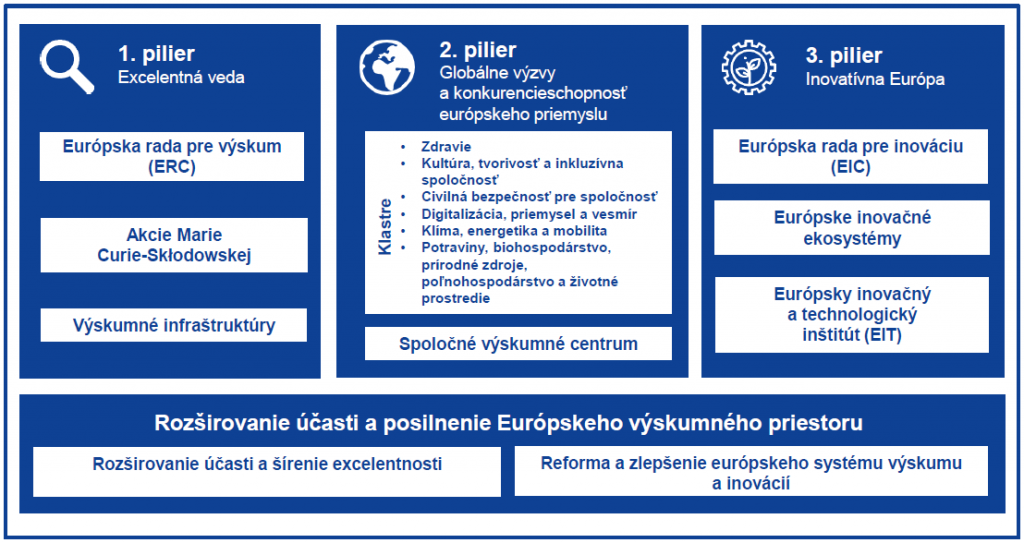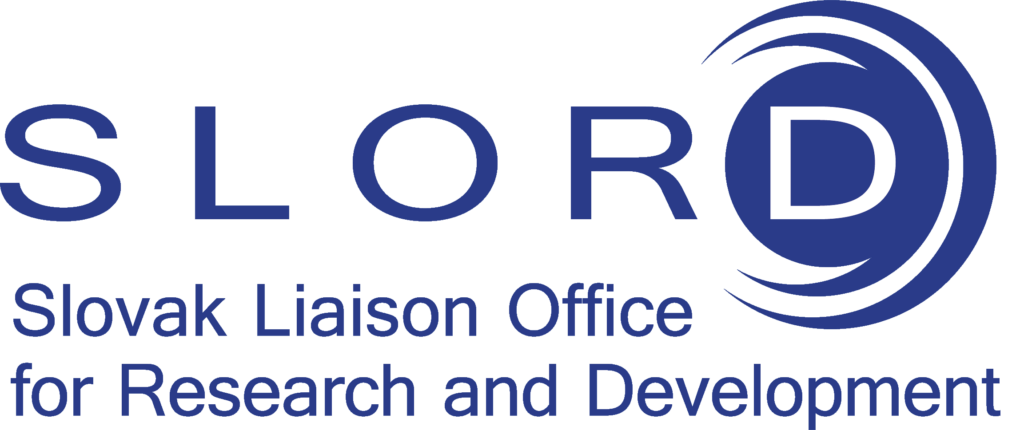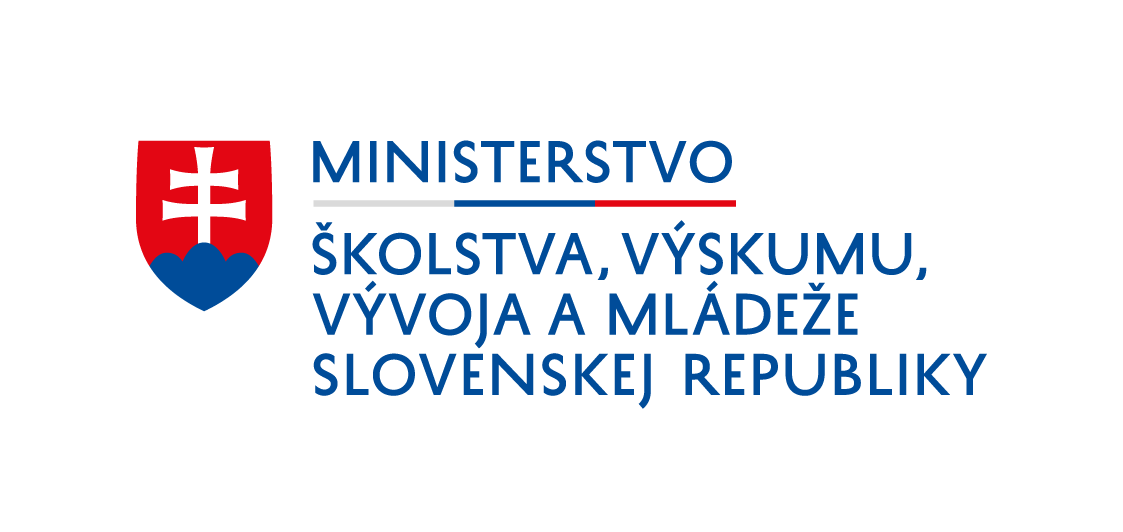Horizon Europe

About the programme
Horizon Europe
is The EU’s 9th Framework Programme for Research and Innovation. In the period 2021 to 2027, it builds seamlessly on the 8. framework programme Horizon 2020 (2014 – 2020).
Horizon Europe has a budget of €95.5 billion for the full seven-year period. The budget also includes €5.4 billion from the Renewal Plan (Next Generation EU).
Pillar
Excellent science
Strengthens the excellence of the European Union’s science base and consists of three components:
European Research Council (ERC)
: support for cutting-edge research projects at the frontiers of knowledge, carried out by individual investigators and their own research teams- Marie Skłodowska-Curie Actions (MSCA): supporting human resources, international mobility, further training and career development of researchers at European or international level
Research infrastructures
: supports the creation of a world-class ecosystem of efficiently functioning and interconnected European research infrastructures (including e-Infrastructures)
Pillar
Global challenges and the competitiveness of European industry
supports research on societal challenges, strengthens technological and industrial capacities and promotes
EU research and innovation missions
with ambitious objectives, tackling some of society’s biggest problems and challenges.
The pillar is divided into 6 clusters, where research and innovation is carried out through collaboration in an international consortium of partners:
- Cluster 1: Health
- Cluster 2: Culture, creativity and inclusive society
- Cluster 3: Civil Security for Society
- Cluster 4: Digital, industry and space
- Cluster 5: Climate, energy and mobility
- Cluster 6: Food, bioeconomy, natural resources, agriculture and environment
II. The pillar also includes the activities of the European Commission’s Joint Research Centre (JRC), which supports EU and national policy makers with independent scientific expertise and technical support.
Pillar
Innovative Europe
supports the creation of breakthrough solutions that contribute to building market and innovation-friendly ecosystems and has three components:
European Innovation Council (EIC)
: provides funding for breakthrough research, development and scaling-up of innovations at all stages of the innovation cycle and acts as a ‘European Innovation Council’. one-stop-shop for all innovators
European Innovation Ecosystems (EIE)
: increase the connectivity, inclusiveness and efficiency of innovation ecosystems by supporting the scaling of businesses and innovation
European Institute of Innovation and Technology (EIT)
: supports the development of dynamic European partnerships between leading universities, research laboratories and businesses through Knowledge and Innovation Communities/KICs
Part of the programme
Widening participation and strengthening the European Research Area
is divided into two components:
- Widening participation and disseminating excellence: support for activities targeted at countries that invest less in science, research and innovation or those with lower science and innovation performance, the so-called ‘SRI countries’. widening countries (including SR)
- Reforming and strengthening Europe’s research and innovation system: supports the enhancement of the quality of the entire European research and innovation ecosystem by promoting open access, making research careers more attractive, promoting gender equality in research and other cross-cutting activities.
Program EURATOM is the research and training programme of the European Atomic Energy Community for the period 2021-2025. The aim of the programme is to carry out nuclear research and training with emphasis on continuous improvement of nuclear safety, improvement of physical protection of nuclear materials and nuclear facilities, improvement of radiation protection, radioactive waste management and nuclear fusion. The basic legislation allows for synergies with Horizon Europe.

One of the key innovations of the Horizon Europe Framework Programme is the so-called ‘Horizon Europe’.
missions
. At the heart of the work of the missions is addressing the most pressing challenges in the 5 mission areas facing both European society and the world today.
For Horizon Europe, 5 mission areas have been identified within which specific activities and projects will be defined in the coming period:
- Cancer,
- Soil health and food (Soil Deal for Europe)
- Climate neutral and smart cities,
- Healthy oceans, seas, coastal and inland waters,
- Adaptation to climate change, including societal transformation.
Each of the 5 identified mission areas includes the so-called. Mission Board, a mission board composed of 15 experts, including its chairman. Experts provide expertise in different fields and their task is to draw up a specific mission concept. At the same time, the so-called. Mission Assemblies, consisting of 22-30 members, which act as advisory bodies to the Mission Boards. The role of the Mission Assemblies is to provide expert advice and thus contribute to the successful achievement of mission objectives.
The Slovak Republic is currently represented on the Soil Health and Food Mission Board by doc. RNDr. Jaroslava Sobocká, CSc., which operates at the National Agricultural and Food Centre (Research Institute of Soil Science and Soil Conservation).
Information brochures on missions in Slovak language:
- EU Cancer Mission: fighting cancer – mission possible!
- EU mission on soil health and food: Caring for soil is caring for life
- The EU Mission for Healthy Oceans, Seas, Coastal and Inland Waters: Sea Star 2030
- EU Mission for Climate Neutral and Smart Cities: 100 Climate Neutral Cities by 2030
- EU mission on climate change adaptation, including societal transformation: a Climate Resilient Europe

A key innovation of Horizon Europe is the reform of the European cooperation system through partnerships.
European Partnerships
will operate in a wide range of areas and their rules of operation will depend on the specific
type of partnership
.
The reform of the partnership system has significantly reduced the number of partnerships and simplified the rules of operation. The number of Horizon Europe projects has been reduced to 49 compared to the previous period of around 120. New partnerships will be established gradually and there remains room for initiating others. Partnerships should have a broader set of actors with greater reach, better visibility and increased transparency. They will also contribute to making Europe’s science, research and innovation ecosystems more open.
The following documents form the basis of the programme:
- Horizon Europe legislative package(Regulation and Specific Programme)
- Strategic Plan 2021-2024
- Programme Guide
Work programmes:
All the latest reference documents can be found on the Funding & Tenders portal
here
.




